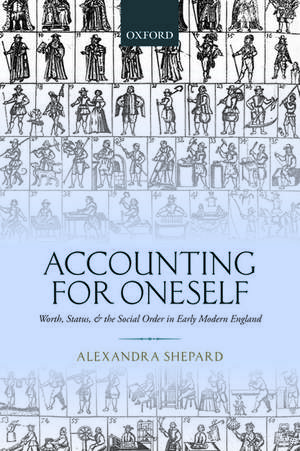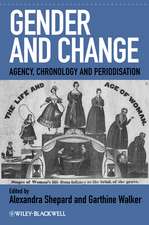Accounting for Oneself: Worth, Status, and the Social Order in Early Modern England
Autor Alexandra Sheparden Limba Engleză Paperback – 12 apr 2018
| Toate formatele și edițiile | Preț | Express |
|---|---|---|
| Paperback (1) | 276.53 lei 31-37 zile | |
| OUP OXFORD – 12 apr 2018 | 276.53 lei 31-37 zile | |
| Hardback (1) | 762.74 lei 31-37 zile | |
| OUP OXFORD – 19 feb 2015 | 762.74 lei 31-37 zile |
Preț: 276.53 lei
Preț vechi: 316.21 lei
-13% Nou
Puncte Express: 415
Preț estimativ în valută:
52.92€ • 55.11$ • 44.73£
52.92€ • 55.11$ • 44.73£
Carte tipărită la comandă
Livrare economică 26 februarie-04 martie
Preluare comenzi: 021 569.72.76
Specificații
ISBN-13: 9780198820468
ISBN-10: 0198820461
Pagini: 384
Dimensiuni: 152 x 233 x 21 mm
Greutate: 0.55 kg
Editura: OUP OXFORD
Colecția OUP Oxford
Locul publicării:Oxford, United Kingdom
ISBN-10: 0198820461
Pagini: 384
Dimensiuni: 152 x 233 x 21 mm
Greutate: 0.55 kg
Editura: OUP OXFORD
Colecția OUP Oxford
Locul publicării:Oxford, United Kingdom
Recenzii
[A]n important and imaginative book, which will shape discussions of the social order in early modern England for years to come... Accounting for Oneself is an extraordinary achievement. It will structure historians' understandings of social order for at least a generation, and it promises to provoke further research so that we better understand the nuances of the changing social order for the early modern period. It is a book that should be on the bookshelf of every modern British historian, and it will help all of us think more clearly about the society we study.
Based on vast evidencenearly fourteen thousand witness depositions, Alexandra Shepard's Accounting for Oneself unpacks how ordinary people valued themselves and defined self-esteem. By attending to the language and the circumstances of these witnesses, among them the poor and women who left little official record, Shepard reveals how, in contrast to middling classes, social order was understood from below. This methodologically innovative book is poised to have a broader impact on early modern European historiography.
[Shepard] has shown what the 'profound breach' that opened between rich and poor in the hundred years after 1550 did to older ways of understanding status -- how the meanings of worth were stretched and finally broken. In doing so she has given us a vivid, original description of that old economic order.
This is a significant, original and often moving book that anyone with an interest in thinking seriously about the relationship between social-structural change, social relations and gender in early modern England would do well to read.
a study of impressive scope ... an exciting project, not least because it grasps the nettle of thinking about the kind of processes of macro-historical change that historians have largely shied away from in the past two decades. Shepard tackles these issues with surety, showing that thorough empirical research and attempts to outline narratives of historical change can be skilfully combined by approaches other than those focused on 'big data' -- the very best historians can do this without sacrificing sensitivity to the human experiences at the centre of historical change. This hugely impressive book provides ample evidence that Shepard is indeed one of those.
This splendid book is therefore likely to prove enormously influential. Shepard has provided us with probably the most important book to be published in the social and economic history of early modern England in the past decade. It will be compulsory reading.
This is a book as rich in its detail as it is original in its argumentation, and it is without question a major contribution to the social and economic history of early modern England.
It is no exaggeration to state that Shepard has produced one of the most important studies of early modern English society to have been written in the last three decades. This is a wonderful book which combines statistical clout with theoretical nuance, and the bibliography alone is an invaluable resource for any early modern social or economic historian ... there is no doubt that this is a magnificent piece of scholarship with which historians interested not only in social rank, gender and age, but also in consumption and political participation, must engage.
wide-ranging, incredibly detailed and rich in historical example and complex analysis. It is a monumental achievement and certain to become a standard point of reference for many years to come.
[A] strikingly original and informative study
[A] compelling new study ... This important book provides an essential bottom-up view of how ordinary men and women accounted for themselves in a rapidly changing world. Painstakingly researched and carefully argued, it should be read by anyone interested in the social and economic transformations of early modern England.
Based on vast evidencenearly fourteen thousand witness depositions, Alexandra Shepard's Accounting for Oneself unpacks how ordinary people valued themselves and defined self-esteem. By attending to the language and the circumstances of these witnesses, among them the poor and women who left little official record, Shepard reveals how, in contrast to middling classes, social order was understood from below. This methodologically innovative book is poised to have a broader impact on early modern European historiography.
[Shepard] has shown what the 'profound breach' that opened between rich and poor in the hundred years after 1550 did to older ways of understanding status -- how the meanings of worth were stretched and finally broken. In doing so she has given us a vivid, original description of that old economic order.
This is a significant, original and often moving book that anyone with an interest in thinking seriously about the relationship between social-structural change, social relations and gender in early modern England would do well to read.
a study of impressive scope ... an exciting project, not least because it grasps the nettle of thinking about the kind of processes of macro-historical change that historians have largely shied away from in the past two decades. Shepard tackles these issues with surety, showing that thorough empirical research and attempts to outline narratives of historical change can be skilfully combined by approaches other than those focused on 'big data' -- the very best historians can do this without sacrificing sensitivity to the human experiences at the centre of historical change. This hugely impressive book provides ample evidence that Shepard is indeed one of those.
This splendid book is therefore likely to prove enormously influential. Shepard has provided us with probably the most important book to be published in the social and economic history of early modern England in the past decade. It will be compulsory reading.
This is a book as rich in its detail as it is original in its argumentation, and it is without question a major contribution to the social and economic history of early modern England.
It is no exaggeration to state that Shepard has produced one of the most important studies of early modern English society to have been written in the last three decades. This is a wonderful book which combines statistical clout with theoretical nuance, and the bibliography alone is an invaluable resource for any early modern social or economic historian ... there is no doubt that this is a magnificent piece of scholarship with which historians interested not only in social rank, gender and age, but also in consumption and political participation, must engage.
wide-ranging, incredibly detailed and rich in historical example and complex analysis. It is a monumental achievement and certain to become a standard point of reference for many years to come.
[A] strikingly original and informative study
[A] compelling new study ... This important book provides an essential bottom-up view of how ordinary men and women accounted for themselves in a rapidly changing world. Painstakingly researched and carefully argued, it should be read by anyone interested in the social and economic transformations of early modern England.
Notă biografică
Alexandra Shepard has published widely on the history of gender relations and social relations in early modern England, including a book entitled Meanings of Manhood in Early Modern England (Oxford University Press, 2003). She has also co-edited a number of essay collections, including most recently (with Steve Hindle and John Walter), Remaking English Society: Social Relations and Social Change in Early Modern England (2013).















